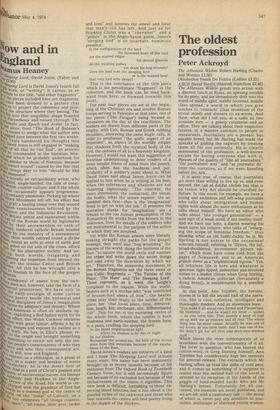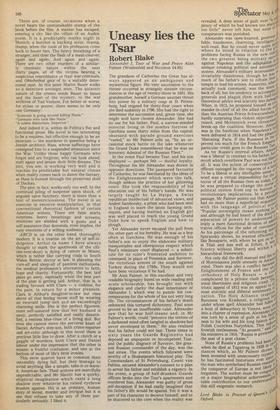The oldest profession
Peter Ackroyd
The Athenian Widow Robert Harling (Chatto and Windus £2.50) Oktoberfest Frank De Felitta (Collins £2.25) ABCD David Slavitt (Hamish Hamilton, £2.40) The Athenian Widow grinds into action with a discreet lunch at Rules; an opening notable for its piety, and we immediately drift into the world of middle aged, middle incomed, middle class spread, a world in which you give lunches to 'contacts' (that invention of the trivial mind) and dinners to ex-wives. And there, what did I tell you, at a table sit two invisible men — a gossip columnist and an editor. They are talking about their respective futures, in a manner common to people in restaurants. Journalists are a prosaic but equable breed, but Mr Harling has made the mistake of gilding the ragwort by treating them all far too seriously. He is clearly enamoured of the profession, a well-known excuse for boring everyone else with it. Phrases of the quality of "like all journalists." "the journalistic way" and "as journalist do" litter the narrative, as if we were kneeling before the Ark.
It is quite true, of course, that journalists are more than willing to live up to, and even beyond, the call of dutiful cliches but that is no reason why Art should be crucified by Nature. In this novel, for example, we have a young and ambitious and left-wing journalist who talks about immigration and human rights with almost the same enthusiasm as he talks about himself. We have an editor who talks about "the younger generation" — a sure sign of a weak mind, if not senility itself. And we have our hero, a diarist wearing his heart upon his column, who talks of "enlarging the scope of feminine freedom," thus showing what an old fuddy-duddy he is. Mr Harling is not averse to the occasional solecism himself, referring to "Dixon, the tall, broad-shouldered, no-nonsense picture editor," which must have come cold from the pages of Newsweek, and to an American grande dame as a "sophisticated tigress." Yes, all inhuman life is here and whatever is specious, tight-lipped, pedestrian and involved comes to a leaden climax when Greg Stirling, a radical American politician (fortunately a dying breed), is assassinated by a sensible citizen.
At this point, Ann Toynbee, the heroine, moves in to kill the second half of the narrative. She is cool, collected, intelligent and thoroughly modern. And an enormous bore: "You make it all sound very formal and Flaubertian, Mr Mortimer. ... And he wasn't my lover — quotes — as you term him. That sounds a kind of trad set-up with me as mistress and all that. The whole thing was far more casual. Actually he was one of my lovers, as you term them. And I was one of his. He didn't go for all this one-man-one-woman stuff."
Which leaves the more contemporary of us breathless with the conventionality of it all. The lover in question, who has braved the cotton-wool, is Greg Stirling himself; Ann Toynbee has considerately kept her memoirs for general release. The extracts which Mr Harling offers us read like slabs of cold pate, and it comes as something of a surprise to realise that the second half of the novel is devoted to its reception at the hands of the gaggle of hind-minded hacks who are Mr Harling's. heroes. Fortunately for all concerned, the memoirs are never published, and we are left with a cautionary tale — the moral of which is, never pay any attention to journalists, politicians or liberated young women. There are, of course, occasions when a novel bears the unmistakable stamp of the book before the film. A maniac has escaped, entering a city like the villain of an Auden poem. It is a predictably murky night in Munich, a butcher is hacking meat, thump, thump, when the tools of his profession come back to haunt him. The heavy breathing of a stranger, and then the flash of a meat-cleaver, again and again. And again and again. There are two other murders of a similarly cinematic nature within the next thirty pages, all of the victims bearing_ a suspicious resemblance Lo Nazi war-criminals, and Oktoberfest gets of to a suitably determined start. At this point Martin Bauer walks as a detective amongst men. The quixotic nature of the crimes sends Bauer to Israel and the heart of' the mystery, to the war archives of Yad Veshem. For better or worse, for richer or poorer, there seems to be only one Germany:
"Someone is going around killing Nazis."
"Germans who look like Nazis."
"A subtle distinction, Inspector."
And indeed it is, within de Felitta's flat and functional prose. His novel is too interesting to be a requiem, but effective enough to be an exorcism — the murderer in question being a Jewish architect, Hass, whose sufferings have consigned him to a suspended animation since the War. Unlike those happy Germans who forgot and are forgiven, who can look ahead, start again and dream their little dreams. The plot, you see, is working very well and it reaches its predictable but natural climax when reality comes back to damn the fantasy, as Hass is hunted through the preserved shell of Dachau.
The plot, in fact, works only too well. In the continual piling of suspense upon shock, of anguish upon butchery, there is more than a hint of meretriciousness. The novel is an exercise in emotive manipulation, in that conventional rhetorical fashion of certain American writers, There are false starts, surprises, heavy breathings and screams, emotions are wielded with a gusto and a self-assurance that demands, even implies, the easy emotions of a willing audience.
ABCD is, on the other hand, thoroughly modern. It is a treatise on the art of self-indulgence. Arthur (a name I have always thought to mark the apotheosis of the citizen-next-door) is dying of cancer in Miami, which is rather like carrying coals to South Wales. Bernie, doctor at law, is planning the cure-all and sleep-all of painless euthunasia, the medical profession's alternative to faith, hope and charity. Fortunately, the best laid plans go awry, especially when the best part of the plan is getting laid. Arthur, that is, is trading favours with Clara — a codeine, for the pain, in return for a minor pleasure. Clara is Arthur's daughter-in-law but rises above all that boring incest stuff by wearing an emerald jump suit arid an exceedingly charming smile. She is the perfect figureen, more self-assured now that her husband is away, perfectly satisfied and easily dissatisfied, a restless blue-rinse of a living doll. But even she cannot move the perverse heart of Daniel, Arthur's step-son, both crime-reporter and art-critic although in this novel there is precious little line to draw. After a clutch or a gaggle of murders, both Clara and Daniel labour under the impression that the other is insane: a fruitful confusion, and one at the bottom of most of life's little ironies.
This eerie quartet have in common their ostensibly dying fall, but they manage to avoid anything like a simple, take-it-or-leaveit, American fate. Their actions are mercifully unpredictable, and Mr Slavitt has a quirky, elliptical imagination which casts a long shadow over whatever his raised eyebrow brushes against. His is an ordinary, human story of incest, murder and intrigue but it is one that refuses to take any of them particularly seriously. I liked it.



































 Previous page
Previous page